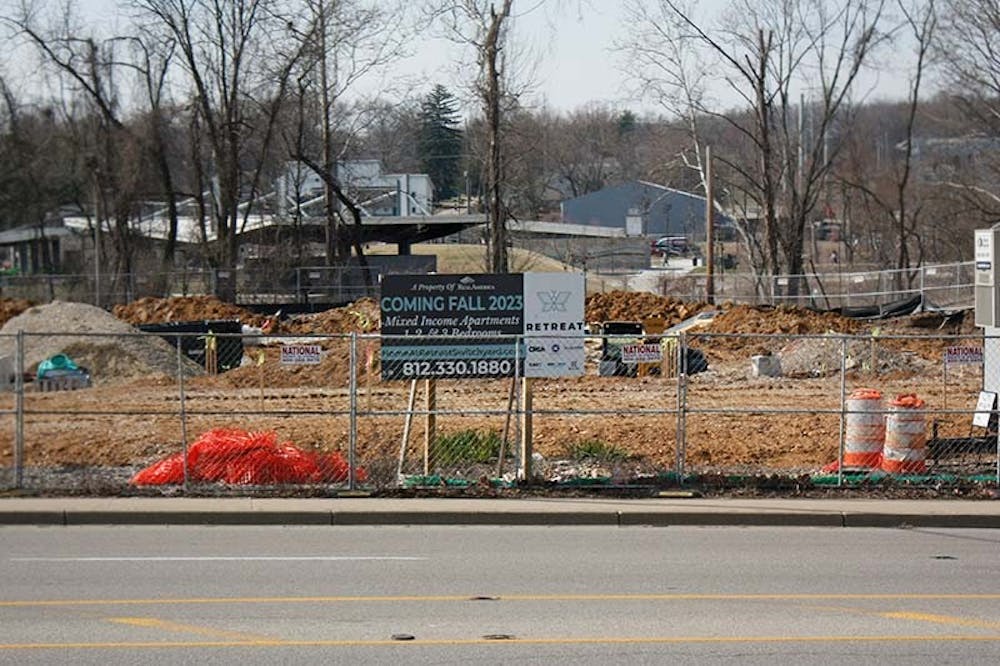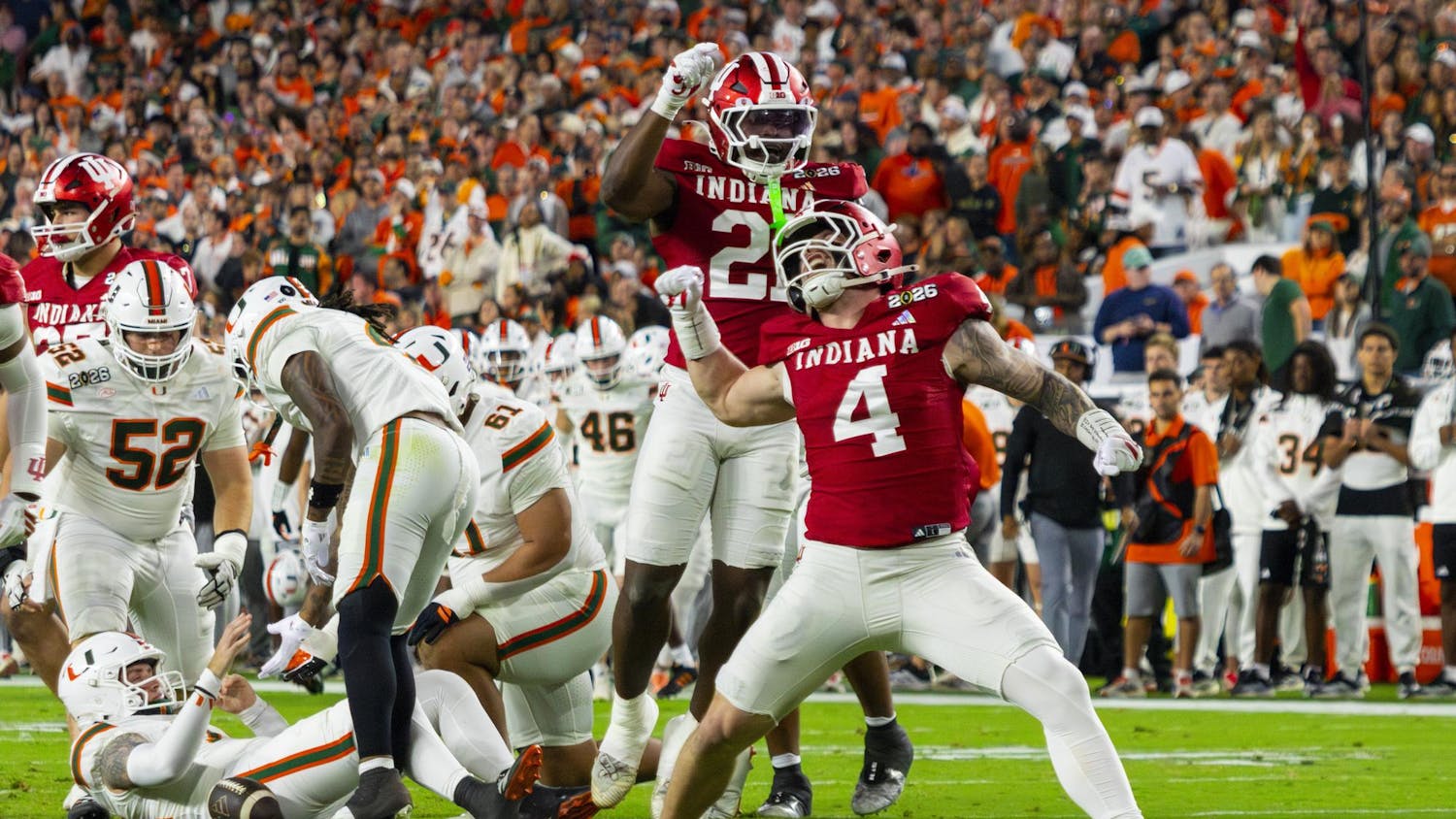Every candidate for mayor lists affordable housing as a priority, and yet both candidates and residents are sharply divided on how to achieve affordability.
As Bloomington grows, housing costs are driven up by high demand, naturally forcing a question of either expanding supply or letting people get priced out of town.
Either way, the affordability crisis in Bloomington will be shaped by whoever assumes the mayor’s office next January. Just two weeks out from the start of early voting on April 4, the IDS reached out to all four candidates running for mayor to get their approach to affordable housing.
[Related: Meet the candidates running for Mayor of Bloomington]
The city’s current approach to affordable housing
John Zody, Bloomington’s director of Housing and Neighborhood Development, said the approach to affordable housing can be divided into three buckets: housing insecurity, rental housing and homeownership.
The first bucket includes people who pay more than 30% of their income on housing. This qualifies them as housing insecure. Zody cited Heading Home, a group dedicated to reducing homelessness, as an example of a city partnership designed to address this issue.
Second is rental housing, which affects both low-income residents and students. In fact, two-thirds of people in Bloomington are renters, Zody said.
Action items for this bucket include rental inspections from the city every few years to ensure safe housing. They aim to increase rental affordability, which is complicated by the high demand: 98% of rental units are occupied, Zody said.
To increase affordability, the city reasons supply must be increased to meet demand and drive down prices.
[Related: City council discusses e-scooters, moving utilities department]
“We don’t control the market, but we can influence the market,” Zody said.
This involves providing financial incentives for companies to build more units, he said, particularly if it’s affordable.
The third and final topic is home ownership, which the city hopes to aid through down-payment assistance programs.
Zody said the city has built 1,400 affordable housing units since 2016, a milestone that has been slowed by high construction costs due to the pandemic.
Another constraint on the city’s housing policy is Indiana law, which prohibits cities from controlling rents and implementing inclusionary zoning.
In 2017, Bloomington attempted to adopt inclusionary zoning policies that would require a developer to make a certain percentage of units affordable. Their plans were stopped due to state legislation passed in the same year banning the practice.
Former deputy mayor and Democrat Don Griffin emphasizes ‘missing middle’ housing
Don Griffin, a Democratic candidate for mayor, said his affordable housing policy would build upon Mayor John Hamilton’s policy by being more intentional about housing projects. Instead of waiting for developers to come to the city, Griffin said, the city should tell developers about ideas for development.
Beyond increasing rental affordability, Griffin wants to expand homeownership in Bloomington. He said only 38% of people own property within the city limits.
To accomplish this, Griffin referenced an urban planning concept called missing middle housing. The concept advocates for housing in between detached single-family homes and apartment complexes, such as cottage courts or townhouses. By creating neighborhoods with diverse types of housing along a range of prices, buyers can have more options to choose from.
“Those opportunities may not look like a picket fence with half-an-acre,” he said.
Griffin said it is also important to be able to retain recent college graduates who are looking for work and an affordable home. He said people typically “boomerang” back to Bloomington after leaving after graduation and said affordable housing could prevent them from leaving in the first place.
“The next generation can’t afford your house in Elm Heights,” he said.
[Related: Bloomington to start construction of B-Line Connection Project]
In the midst of the affordable housing debate, some have said that increased housing density reduces green space and harms the character of Bloomington. Griffin disagrees, saying increased density actually keeps green space by reducing urban sprawl.
Griffin also said people didn’t worry about changing the character of a neighborhood when it was primarily people of color or working-class people that lived there.
“It’s time to help people of color and other marginalized people get home ownership,” he said.
When it comes to the unhoused population, Griffin said providing mental health and substance abuse services is critical. He said he supports increasing transitional housing for people experiencing homelessness and preserving Bloomington’s role as a regional hub for resources.
Griffin also said he felt some people were afraid that if the city does too good a job of providing for the unhoused community, it would encourage more people to come to Bloomington in search of services.
“I think that’s actually stopping us from doing our very best,” he said.
Independent candidate Joseph Davis talks home ownership, self-empowerment
Joseph Davis, an independent running for mayor, emphasized his background in natural building to make an argument for a housing policy that prioritizes ownership.
After building his own house when he moved to Bloomington, Davis said people began contacting him for guidance in how to do natural building themselves. The process involves maximizing the natural patterns of the Earth, including heating and cooling.
A key to Davis’s campaign is the idea of self-empowerment. Davis lamented society’s habit of “outsourcing” things they could learn how to do themselves, such as simple repairs or increasing energy efficiency. He also would prioritize equity ownership over rentals whenever possible, he said.
“The American dream is what our country was built on,” Davis added. “This idea that everyone can achieve their own little kingdom, or queendom.”
Ownership should not just be for the wealthy, Davis said, and he hopes to provide home ownership to the unhoused community as well.
One way to do this is to help unhoused community members with felonies get their charges expunged, he said. Davis also said he had talked to people experiencing homelessness who refused to go to supportive housing centers because they viewed them as unsafe.
[Related: City argues state legislation is unconstitutional in second annexation lawsuit]
Davis criticized the city’s policy of giving what he calls “monster structures,” the ability of complexes to add stories in exchange for a small percentage of affordable housing. Davis said the policy guarantees profits for real estate investors but not real gains for the community.
He also said IU should be responsible for housing their increasing number of students, suggesting “university villages” that would be close to shops and restaurants, hopefully encouraging students to stay on campus all four years.
Davis said he supports mixed communities of housing, whether it be townhouses, condos or homes, renters and people on public assistance. He said these arrangements would help all types of people see the real-life struggles of those in need.
He also suggested making homes smaller to increase ownership opportunities for a cheaper price.
He said realtors have had too much power in the city, and that more working-class people need to apply for positions on city boards.
“Housing is a right that has been mostly a wrong with our current administration, and now is the time to make a change,” he said.
Candidates Kerry Thomson and Susan Sandberg did not respond to an interview request by publication.
[Related: 'Some of my neighbors were actually in tears': Opposition to annexation continues amid lawsuits]
According to Thomson’s 5-Point Housing Plan, Thomson wants to implement recommendations from the city’s 2020 housing study, develop a method for resident-driven neighborhood enhancement projects, “audit” the city’s existing process of approving housing projects and inspections, increase partnerships and maximize existing housing resources.
Sandberg opposes the recent change to the Unified Development Ordinance that allowed for multi-family housing like duplexes and triplexes in parts of Bloomington’s downtown, according to her website. There, she writes that existing single-family homes are already the most affordable options because they allow people to build wealth. She writes that she plans to change the city’s zoning code and oppose “big box” developments. She also wants to create affordable rental housing and home ownership opportunities for low-income and working families through public-private partnerships.
In an interview with the IDS after publication, Thomson reiterated her comprehensive approach to housing, which she said will not only focus on creating affordable housing, but also retaining current affordable housing stock.
She said the city is still far away from having supply meet the demand for housing and emphasized workforce housing.
“Frankly our workforce simply can't afford to live in Bloomington,” Thomson said.
Thomson expanded on her goal to audit the existing affordable housing approval process, saying developers often get hit with costly changes once they get to the plan commission or city council. Thomson said these expenses get passed on to the consumer.
By examining the process itself, Thomson hopes to make things more transparent for developers.
In response to concerns about how housing projects may change the character of the city, Thomson said she wants to ensure developments fit the community’s vision. Through her experience with Habitat for Humanity, Thomson said she understands that housing is personal.
“I think it’s critical that we get housing right,” she said.
She plans to accomplish this with the neighborhood planning aspect of her housing plan, which she said will ensure residents have a voice in the process.
On the topic of creating neighborhoods with mixed housing types, Thomson said she supported a diversity of housing but that it may only be appropriate in some areas of the community.
CLARIFICATION: This story has been updated to include a response from Kerry Thomson who responded after publication.




